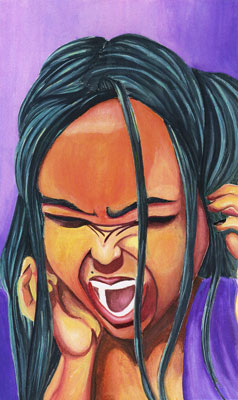All Nonfiction
- Bullying
- Books
- Academic
- Author Interviews
- Celebrity interviews
- College Articles
- College Essays
- Educator of the Year
- Heroes
- Interviews
- Memoir
- Personal Experience
- Sports
- Travel & Culture
All Opinions
- Bullying
- Current Events / Politics
- Discrimination
- Drugs / Alcohol / Smoking
- Entertainment / Celebrities
- Environment
- Love / Relationships
- Movies / Music / TV
- Pop Culture / Trends
- School / College
- Social Issues / Civics
- Spirituality / Religion
- Sports / Hobbies
All Hot Topics
- Bullying
- Community Service
- Environment
- Health
- Letters to the Editor
- Pride & Prejudice
- What Matters
- Back
Summer Guide
- Program Links
- Program Reviews
- Back
College Guide
- College Links
- College Reviews
- College Essays
- College Articles
- Back
My Black Is Beautiful MAG
I grew up in a household where “you’re so beautiful”, “look at my pretty girl”, and “you are beautifully, uniquely, and wonderfully made” competed with oxygen to fill the air. However, upon entering kindergarten, my classmates came to challenge the words of my family. Throughout kindergarten, I was ridiculed by a White boy in my class, who repeatedly called me “doo-doo face girl”. I remember hysterically crying on the shoulders of my dad, who told me not to worry about him because he just didn’t understand what true beauty looked like. In first grade, while on the bus home from a field trip, a girl asked me why my lips were so big and full rather than small and thin like hers. That night, I asked my mom and she simply explained my lips were bigger because there was so much beauty in me it could barely be contained and my lips were the physical evidence of this.
After I moved to Ghana, these kind of insults to my skin color and my natural traits reduced, but sadly never came to a complete halt. Even in Ghana, though having round lips and and wide hips were praised, dark skin wasn’t. All around I would find people talking about bleaching their skin and perming their hair. Without meaning to, I found myself disregarding the positive reinforcement I was raised with, and trading it for a more eurocentric look. I brainwashed myself into thinking I needed to look like the White girls on my Tumblr dashboard with skinny thighs, flat stomachs and light skin. Though I never bleached my skin, I did fall into the trap of a whitewashed perception of beauty.
By the time I moved back to America for school, I was more matured and confident in my Black beauty, but, alas, this was now challenged by none other than my fellow Blacks. Now, the goal was to have some melanin because White was too pale, but not so much melanin that you appeared burnt. In Ghana, I was the same shade of brown as everyone else, but here at my current school, I am considered “dark”. It was here that I was exposed to the system of colorism. Much like racism, colorism is based on the brownness of one’s skin; a hierarchy where light skin was at the top and dark skin at the bottom. My fellow Black classmates had a tendency to subtly remind me that my type of Black wasn’t appealing. They passed comments such as “make sure you use a filter, so you don’t look too black” or “why would you dye your hair black, it makes you look even darker”. It made me feel nowhere near beautiful. I felt then that though black was beautiful, only a certain type of black was.
However, this past summer everything took a turn for the better. My older sister displays unwavering confidence in herself and her beauty, despite going through similar demeaning experiences. Through observing her, she showed me that Black is beautiful - all Black. She reinforced the foundation that had been laid in my youth, but had been hidden under years of discrimination by teaching me that regardless of how I see myself, people will always feel compelled to comment about me. She also explained that words are influential, in that they can build you up or break you down. Therefore, it is up to me to decide which people and words are worth listening to and allowing to alter my self-perception.
I’m grateful for these bad experiences because they have taught me to value and appreciate myself so much more. I’ve reached a point where if I dye my hair black or wear dark clothing, I no longer fear being ridiculed for “blending into the night”. When I cut the artificial smoothness of my relaxed hair off to display my God-given, kinky, afro hair, I am not concerned with looking different or untamed to the people who can’t appreciate me. “Doo-doo face”, “Too black”, “Nappy head”. These phrases, though impactful through the pain they cause, will not bring me down. Words are influential, but we have the power to determine whether those words will build us up or break us down. The words I have chosen to effect me are the words I know are true to me, that Black is beautiful. These are the words that stand strong in me and that I have allowed to influence my opinion of myself.
My sister reminded me my Black is beautiful. The deep pigmentation of my skin is beautiful. The fullness of my lips and the sway of my hips, all of it, beautiful. I am me, I am Black and I am Beautiful.

Similar Articles
JOIN THE DISCUSSION
This article has 4 comments.
My response to a question asking about words that impacted me as a person of colour.